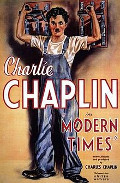
Directed by
Charles Chaplin
89 minutes
Rated G
Reviewed by
Bernard Hemingway


Modern Times
Modern Times, a kind of comedic version of Fritz Lang’s Metropolis (1927) starts brilliantly as a satire of the Machine Age with Chaplin’s Little Tramp metaphorically (and in one of its classic moments literally), crushed by capitalism’s relentless appetite for profit (Although the film direct references the Great Depression, Chaplin was influenced by Mahatma Gandhi’s anti-industrial position). It doesn’t quite maintain the satirical bent particularly when Paulette Goddard enters the scene as an orphan, the film ending on a rather twee note, literally Chaplin’s song which eventually become the MOR standard 'Smile'. Even so there are some marvellous set pieces such as the feeding machine, the “nose powder” scene (a daring move as the Production Code, established in 1930, forbade the depiction of illegal drug use in films) the department skating scene (which used trick photography) and the shipyard scene
Chaplin started working on the film in 1934 and intended it to be a “talkie” but, fearing that the Little Tramp would lose his appeal if he spoke he eliminated nearly all the dialogue and released the film in the silent format with synchronized sound effects, although The Tramp does sing, albeit in gibberish, in the restaurant scene. Most of the film was shot at the "silent speed" of 18 frames per second, which when projected at "sound speed" of 24 frames per second, made the slapstick appear even more frenetic.
FYI: Modern Times was the final appearance of the Little Tramps character. French existentialist philosophers Jean-Paul Sartre, Simone de Beauvoir and Maurice Merlau-Ponty named their journal, 'Les Temps Modernes', after the film
Want something different?





